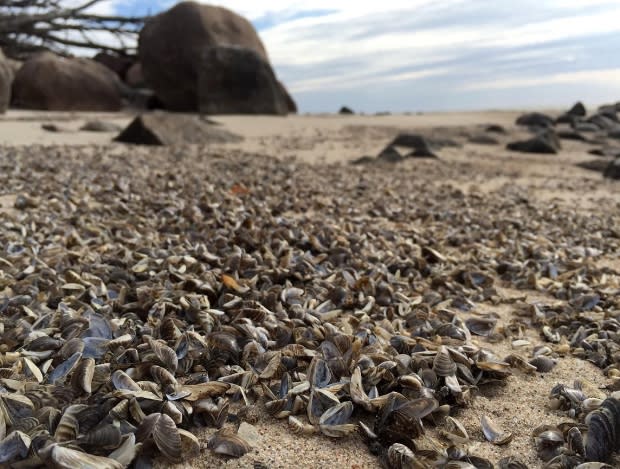10 watercraft entering B.C. since April found with invasive mussels
The Okanagan Water Board is renewing its call to the province to implement stronger inspection programs for watercraft coming into B.C., after discovering that between April 1 and July 5, there were 10 watercraft intercepted carrying the adult invasive species.
Currently, B.C. has two mussel detection dogs and 12 provincial inspection stations but only one of which, near Godlen, B.C., is open 24 hours a day. Boats coming into the province are required to get an inspection, but not if the station is closed.
"We need to tighten things up. This is of paramount importance," said Okanagan Water Board chair Sure McKortoff in a statement.
In a letter to the minister of environment and climate change strategy, the board, which created the outreach campaign Don't Move a Mussel, makes a number of recommendations, including the request for legislation requiring all watercraft coming into B.C. to be inspected before entering any provincials bodies of water.
This would mean that even if a vessel enters the province outside of an inspection station's operational hours or in the off season, it would still need to be inspected.
The board's letter also states that an infestation of invasive mussels in the Okanagan would cost at least $42 million a year to manage.

The ministry said in a statement that the province works with neighbouring jurisdictions to prevent the spread of invasive mussels, in addition to providing annual funding for the Invasive Mussel Defence Program.
"We know quagga and zebra mussels pose a serious threat to B.C.'s aquatic ecosystems, salmon populations, hydro power stations and other infrastructure facilities and we are working to ensure appropriate protections are in place."
So far, the province says there haven't been any invasive mussels detected in B.C. waterways.
Lake Winnipeg problem
While B.C. may not have an invasive mussel problem yet, many lakes in Eastern Canada have had to deal with mussels taking over their ecosystems, such as the Laurentian Great Lakes and Lake Winnipeg.
"The challenge is once zebra mussels are in a lake, it is almost impossible to get rid of them," said Scott Higgins, a research scientist at the International Institute for Sustainable Development in the Experimental Lakes Area in western Ontario.
Both zebra and quagga mussels can be found in densities of 10,000 individuals per square metre at the bottom of the lake, he told Radio West host Sarah Penton.
"This is really huge and this is where Lake Winnipeg is heading."
The invasive mussels often attach themselves to boats, and can live up to two weeks out of the water, making it easy for them to travel. When they do, they have the ability to change the ecosystem of a new lake affecting everything from the sediment bacteria to the fish, said Higgins. They also have sharp shells that can cut people's feet when they walk on them.
"Their ability to change food webs and the things that we enjoy about lakes is among the highest of any invasive species."
To stop this from happening in B.C., Higgins says we need to be more vigilant about inspecting boats and trailers as they travel between water bodies.
"In my opinion, the resources to put at inspection stations now are well worth it, because it is much cheaper to try to stop their establishment in B.C. than it is to deal with them once they're there."

